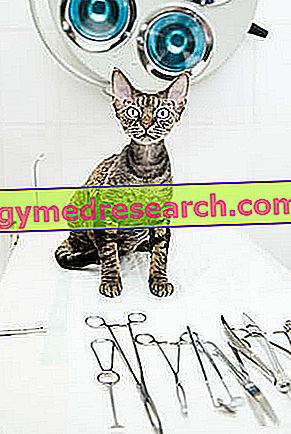Eunuchs
Eunuchs are men who are castrated before puberty.
In the past, the removal of the testicles was a relatively common practice for some categories of people.

In the eastern courts, for example, the eunuchs were entrusted with the custody of the harems; in this case, the males were subjected to the removal of both the testicles and the penis, so as to render them completely incapable of performing sexual activity. In the West, on the other hand, pre-pubertal castration was considered an expedient for maintaining the high pitch of the voice, a particularly useful characteristic for sopranos and those who participated in ecclesiastical choirs; in the eighteenth century, for example, the farinelli soprano castrato (born Carlo Maria Michelangelo Nicola Broschi) became famous.
Physical characteristics
Castration before the age of development ensures the maintenance of an infantile appearance and voice, of flowing hair, of a scarce and poorly toned muscle mass, of a skin that is mostly "hairless" (without hair), of a penis poorly developed, of a submissive behavior, anything but bold.
In practice, with the pre-pubertal castration the development of secondary male sexual characteristics is lost; this is because these characteristics depend on the increase in the levels of circulating androgenic hormones (testosterone and derivatives), which occurs starting from puberty due to the increased testicular synthesis.
eunuchoidism
In the medical language, the term eunucoidismo indicates the insufficient production of androgens by the testicles. In this sense, eunocoidism can be considered a synonym of male hypogonadism.
A eunocoid subject is therefore a male that presents a poor synthesis of androgens at the testicular level.
Consequences of eunocoidism
Some authors use the term eunocoidism to indicate the classic phenotype (outward appearance) of hypogonadic men since the prepubing age. In fact, these subjects have a phenotype similar to that of the eunuchs, which can be summarized as:
- sexual infantilism: testicles smaller than 4 millimeters, micropenis, a voice that does not acquire the masculine timbre, lack of development of the scrotum and glands, underdeveloped down;
- macroschelia: the lower limbs (and upper) are much more developed than the trunk;
- submissive behavior: poor sexual desire, poor spirit of competition, apathy.
If instead hypogonadism occurs in adulthood, secondary sexual characteristics are normally developed; however, a female distribution of body fat is common; the subject, in fact, tends to present greater concentrations of fat at the level of the breasts (gynecomastia), hips and buttocks. Furthermore, there is a decrease in libido and muscle strength.
Causes
The causes of hypogonadism and aocoid are: inadequately treated cryptorchidism, genetic diseases such as Kinefelter syndrome or Noonan syndrome, congenital malformations of the testicles (testicular dysgenesis), traumatic or surgical castration, testicular irradiation, pituitary tumors and / or hypothalamus.
Treatment
In cases of eunucoidism due to castration or irreversible causes (eg genetic diseases), the treatment consists of androgen-based replacement therapy: in practice, doses of artificial testosterone or its synthetic derivatives (anabolic steroids) are periodically injected into the subject .



